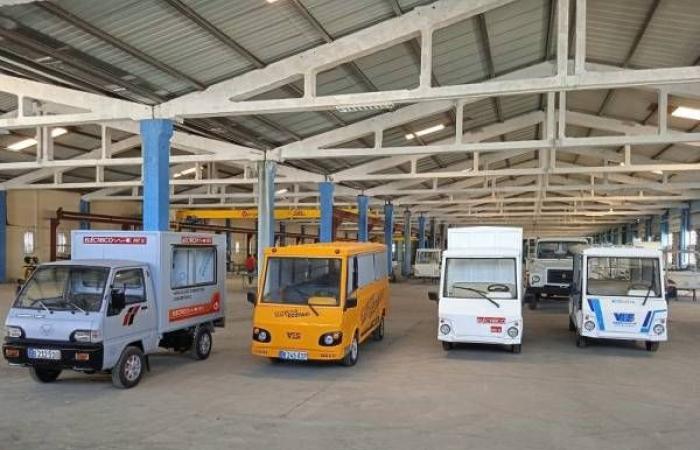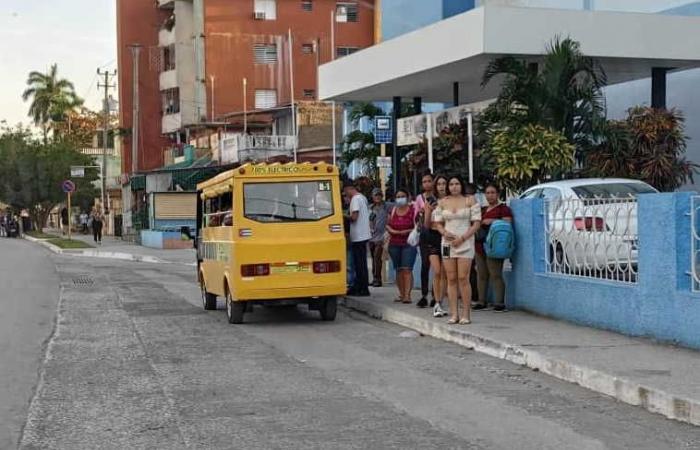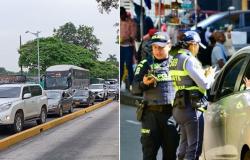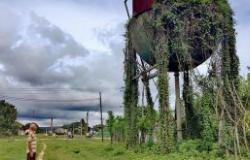SANCTI SPÍRITUS.— It is enough to stop the step in the face of the hectic daily life and you can see them like ants crossing from one side to the other the ends of the city of Yayabo. It happens every day, during times of greatest demand. The electric minibuses designed and built in the Cerámica Blanca base business unit (UEB) seem like breaths of air in the complex scenario of public transportation.
«This came at the right time. They are comfortable, fast, the drivers are pleasant, you are not cramped, you catch your breath and, for only ten pesos, you cross the city,” Estela López, a regular passenger, describes this service.
The first one rolled in April 2023. It then captured the attention of media headlines and the opinion circles that are generated in the most popular corners of the 510-year-old town. Today there are five that are part of the daily life of residents and visitors in the provincial capital.
«The first thing we did, as a ministerial task, was repair the circuit carsinternal connection of the hotels, mainly in the northern keys of Villa Clara,” recalls the young engineer Frank Plasencia Martínez, productive technical director of the UEB, belonging to the Francisco Aguiar Rodríguez Industrial Military Company (EMI).
He adds that “with that experience we took on the task of manufacturing a Cuban prototype for customer transportation. It is being tested at the Playa Cayo Santa María facility, with very good acceptance. It was then that the idea of the minibus for exploitation in public transport arose.
A summary that in a quick reading dissipates the months and months of study and work sustained in the creative ingenuity of those who promote a project exclusive to the Spiritus industry, which responds to the transportation electrification program that the country is undertaking.
«We know that in other provinces there are entities that have ventured into the exploitation of electric vehicles. How are we different? That ours is completely nationally manufactured. We import only some components that do not exist here. Therefore, with one or two containers we make many vehicles. The same does not happen if we dedicate ourselves to assembly, as happens in other places,” explains the person who is eagerly awaiting approval after registering the VES brand, or Sancti Spiritus electric vehicle.
Yesdreams to roll
With concrete results that confirm the feasibility of this economic and useful alternative based on public transportation and the good opinions of passengers, registered by the state MSME Ecomóvil Sancti Spíritus, the group—mostly young—of the UEB Cerámica Blanca has already talks about rolling out many other ideas.
“We are working to deliver 50 minibuses to the Ministry of Transport and 200 next year,” says Gerardo Yero Morejón, head of the research and development group at the UEB. He adds that they have the Energy Transition of Urban Transport project, which includes the design, manufacture and implementation of a kit made up of electric vehicles (EV), solar charging stations (solineras), totally independent of the national electro-energy system, and a park photovoltaic for the manufacturing and assembly line of a totally ecological product.
To do this, they have knocked on the doors of other entities such as the Territorial Delegation of the Ministry of Science, Technology and Environment (Citma), the national management of this organization and the Transportation Directorate in the Provincial Administration of Popular Power, as well as the University of Sancti Spíritus José Martí (Uniss), in search of guides and financial support that will allow savings to be realized from replacing internal combustion vehicles with EVs and, thereby, reducing the consumption of hydrocarbons and CO emissions2 to the environment by applying and using renewable energies.
«This project is the first in the country. We would start with Sancti Spíritus, then the central region, later the west and, finally, the east. We are talking about 561 kits for urban transport and, if more are needed, we will expand,” he says.
In order to demonstrate effectiveness, these guys today insist on the need to buy at least the first two solineras through a Villa Clara MSME, because the instability of the service affects the loading times of the vehicles and, therefore, they cannot offer their services as frequently as they were intended.
lwash for science
Once again, the Faculty of Technical and Economic Sciences of the Uniss demonstrated that the knowledge and expertise of its faculty and students need to go outside its walls. A call from José Lorenzo, director of Transportation in the Provincial Administration of People’s Power, was enough for the house of higher studies to include among its priorities the project that seeks to reduce CO emissions.2save electrical energy generated for charging EVs, optimize the manufacturing and assembly line of these and incorporate ecological kits into urban transport.
A team of professors and students from the Industrial Engineering day course belongs to the project, says Carlos Lázaro Jiménez Puerto, vice dean of Research and postgraduate studies at said Faculty. «We have already achieved some short-term science results. For example, the IRIS United for Climate Foundation, a driving organization for the environmental area in Cuba, Latin America and the Caribbean, approved the project for its environmental and social impact as it generates employment opportunities.
The Sancti Spiritus microbuses alleviate the tense public transport situation. Photo: Taken from Escambray
«Likewise, Citma financed us a project that seeks to build skills and disseminate what is done here. We were also approved for a significant amount, after opting for national funding for Science and Innovation from the Ministry of Science, Technology and Environment.
«When we have the first ecological kits in operation, it will allow us to have concrete results and thus present ourselves to international calls to obtain financing to acquire solineras directly outside the country and the photovoltaic park, which would be located at the UEB Cerámica Blanca and which “It would directly affect the production process.”
Along with these steps and the delivery of recognition in Cubaindustria 2024, Uniss as a dynamic actor in the science generated in its sphere of action is also savoring the possibility of creating a teaching unit at the UEB.
“Our impact is the internal transformation of the company through the incorporation of professionals who optimize production processes,” acknowledges Dariel Rivadeneira Casanueva, head of the Industrial Engineering Department. «Our students will join directly the vehicle production cycle, which is practically something exclusive in Cuba. Therefore, they will be accompanied by those who lead the entire process. For us, this project has a great social, economic and environmental impact.
Without a doubt, the work of these young people drives more than vehicles without fuel through the city of Yayabo and, in the future, throughout the country. It moves the thinking, ingenuity and creativity of those who, with their contributions, make what is now rightfully the capital of electric cars grow.







